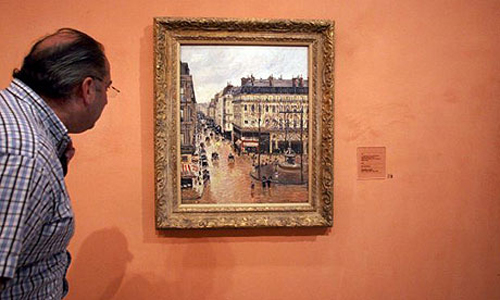
MADRID (WJC) –Spain’s world-famous Thyssen-Bornemisza Museum should return the Impressionist masterpiece ‘Rue Saint-Honoré’ to the heirs of the Jewish family from whom it was stolen by the Nazis shortly before World War II, the president of the World Jewish Congress urged on Friday. The Madrid museum is owned by the Spanish state.
“Since 1988, Spain has been a party to three different declarations, signed by dozens of nations, committing it to return looted art or settle with victims’ families expeditiously,” said WJC President Ronald S. Lauder, who is also chairman of the Commission for Art Recovery. “Instead, the Spanish government and the museum have subjected the late Claude Cassirer and now his heirs to a decade of litigation largely on technical legal issues. We are calling on Spain to fulfill promptly their moral obligation to this family.”
In 1939, Lilly Cassirer sought to flee Germany, where her Jewish family had long played a prominent role in economic and cultural life. In exchange for passage, she was forced to sell to the Nazis, for the equivalent of US$360, a masterpiece by Camille Pissarro called ‘Rue Saint-Honoré’ that had been purchased by Lilly’s father-in-law and held by the family for 40 years.
In 2000, Lilly’s grandson Claude discovered that the painting was on display in the museum, which houses the collection of the late Baron Hans-Heinrich Thyssen-Bornemisza, the nephew of Fritz Thyssen, one of the German largest industrialists in the Third Reich. After being rebuffed in his efforts to have the painting returned, Claude filed suit in 2005 against the Spain and the museum. Since his death, his two children, together with the Jewish Federation of San Diego County, have continued the fight to restore their family’s legacy.
“The Museum’s decision to exhaust every possible means of delay, and to refuse even to meet with the representatives of the Cassirer family to explore an amicable settlement, is deplorable,” said Lauder, adding: “It is also contrary to agreements such as the Terezin Declaration, which Spain, along with dozens of nations, agreed to uphold.” The 2009 Terezin Declaration instructed nations that Holocaust claims should be resolved on the merits, and not on the basis of technical legal defenses, such as the passage of time.
“For Spain and the museum to ignore the International Principles in this litigation not only seriously undermines the efforts of families to recover stolen art, but also discourages others from asserting their rights to property stolen by the Nazis. Spain’s recent decision granting the descendants of Jews forced into exile centuries ago the right to dual citizenship indicates that the country is seeking ways to address some of the nation’s darker history with respect to the Jewish people. We believe that an ethical and fair response to the Cassirer family’s claim would be a valuable and significant next step in this effort.”
Lauder noted that Spain had recently requested and obtained enormous assistance from the United States in recovering from a collector in Texas treasured works of art stolen from a Spanish church more than three decades ago, but had rebuffed all requests from the US for the return of the Cassirer Pissarro. “We are calling upon Spain to be a responsible member of the community of nations and to uphold the values that the country itself has relied upon in seeking return of its own cultural treasures,” Ronald S. Lauder declared.
*
Preceding provided by World Jewish Congress